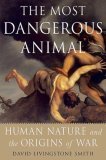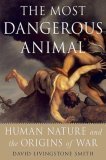
‘The Most Dangerous Animal
‘ of David Livingstone Smith’s title is, of course, man. It is man’s continued determination to band together in order to slay members of its own species that qualifies us for this most dubious of superlatives. The question this book tackles is simply: why? Smith employs a variety of academic disciplines to answer this question. It crosses territory from psychoanalysis to prehistoric archaeology and even microbiology, but the heart of his argument lies in evolutionary psychology.
In the first place Smith is keen to point out that when we talk of war, we are not talking of the sanitised version seen on our TV screens or at the cinema. He means the real thing – where it’s the lucky ones that die quickly. Consequently the book is scattered with descriptions that are not for the weak-stomached. The point is well made though, that if war is so…well…obscene, then why do we do it?
Smith explains. As social primates we share the violent and xenophobic tendencies of our chimpanzee cousins. Like the chimpanzees and the rest of life on Earth, our brains are the result of evolution. Our brains give us the power to imagine great things. But most of our mental modules process information outside of our conscious awareness. We are, therefore, at once both supremely imaginative and yet cut off from our most basic cognitive processes.
Central to our war-like behaviour and built on the inaccessibility of our internal processes, is our ability to lie to ourselves. Self-deception is also vital to our ability to deceive others. If we can trick ourselves then we can do the same to others.
What do we do with this amazing capacity for imagination and self-deception built on a bedrock of inaccessible processes? Well, one thing we do is create morals. Put simply, morals are our ideas about the difference between right and wrong. Although some will (incorrectly) tell you otherwise, our morals are not constructed in a neutral fashion and are not of an absolute nature. Instead we demonstrate a number of important biases.
First we have a moral bias towards those who are similar to us. Most importantly we value the lives of those who are more like us to a greater extent than those who are less like us. That’s why if a plane crash happens in a far away country, your local news tends to focus on, or at least mention, the people from your country, even if they only form a tiny minority of the victims.
The second moral bias is that we care less about people we don’t directly come into contact with. Third is our bias towards those we are related to – if you have to choose between rescuing your two children or two strangers from a burning building, you’ll leave the strangers to burn. Any other choice makes you deranged.
These three biases (actually from philosopher David Hume) dovetail beautifully with sociobiological theories. Effectively these find that ingratiating ourselves with others through apparently altruistic acts is vital to our own survival. As a result of these biases, morals are inevitably culture-specific and will inevitably favour the group of which we are a member.
What we might have so far is a reason to go to war, but it doesn’t yet explain how humans actually go through with the bloody act itself. After all, could you actually kill another person?
For this Smith again calls on our powers of self-deception. Soldiers in battle have to rely on creating both psychological and physical distance from the enemy. In the age of modern technological warfare, physical distance is now much easier to accomplish. Bombers can loose their deadly loads without directly confronting the results of their actions.
Psychological distance is achieved by not looking too closely at the ‘target’. The old adage of not opening fire until you can see the whites of their eyes is precisely the opposite of what war requires. Politicians and generals must dehumanise the enemy to make them easier to kill. The last thing the majority of soldiers want is to look into the eyes of those they are killing.
The strength of Smith’s work is that the outlines of war do genuinely emerge by drawing on disparate academic disciplines. In particular his use of evolutionary psychology makes this book attractive to those interested in psychology.
Right from the start Smith is determined to make this an accessible book, which he does. No prior knowledge is required to follow his arguments, for example even the basic processes of evolution are outlined. The prose is also clear and straightforward. This is a fascinating response to a question we ignore at our peril: why war?
» Buy The Most Dangerous Animal: Human Nature and the Origins of War

